Posted on May 24th, 2010 by Jaimie Schock
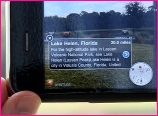 Augmented reality (AR) technology is being hailed as the next big thing in the wireless world. Unlike virtual reality, which lets people seemingly enter artificial worlds, AR overlays digital information on real-world images viewed through the cameras of GPS-enabled handhelds, like smartphones. And already, one developer, Digital Tech Frontier, is marketing to schools its Augmented Reality Development Lab (ARDL) technology as a learning tool.
Augmented reality (AR) technology is being hailed as the next big thing in the wireless world. Unlike virtual reality, which lets people seemingly enter artificial worlds, AR overlays digital information on real-world images viewed through the cameras of GPS-enabled handhelds, like smartphones. And already, one developer, Digital Tech Frontier, is marketing to schools its Augmented Reality Development Lab (ARDL) technology as a learning tool.
Read More
Filed under: K-12 Education News | Comments Off on Augmented Reality in Classrooms
Tags: Augmented Reality, Teaching Aids, Technology, Technology for Learning
Posted on May 24th, 2010 by Jaimie Schock
 When it comes to helping kids learn science, parents and educators agree that Mom and Dad are falling down on the job, according to a new survey of 500 science teachers and 506 parents. A whopping 98 percent of the teachers surveyed said that parental involvement is important to keeping students interested in science. And, 94 percent said they wish their students’ parents had more chances to engage in science with their children. Seventy-seven percent suspected that too many parents just don’t feel comfortable with science topics to be of much assistance.
When it comes to helping kids learn science, parents and educators agree that Mom and Dad are falling down on the job, according to a new survey of 500 science teachers and 506 parents. A whopping 98 percent of the teachers surveyed said that parental involvement is important to keeping students interested in science. And, 94 percent said they wish their students’ parents had more chances to engage in science with their children. Seventy-seven percent suspected that too many parents just don’t feel comfortable with science topics to be of much assistance.
Read More
Filed under: K-12 Education News | Comments Off on Parents Need to Pitch In
Tags: Research on Learning
Posted on May 24th, 2010 by Jaimie Schock
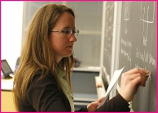 Too many science teachers in the U.S. — especially at the elementary and middle school levels — aren’t fully qualified to teach the subject. For instance, more than 70 percent of middle school science teachers in Chicago schools do not have a degree or endorsement in science. To address that problem, Chicago’s Museum of Science and Industry and the Illinois Institute of Technology (IIT) have teamed up to offer what they say is a first of its kind program to bolster the skills of middle school science teachers.
Too many science teachers in the U.S. — especially at the elementary and middle school levels — aren’t fully qualified to teach the subject. For instance, more than 70 percent of middle school science teachers in Chicago schools do not have a degree or endorsement in science. To address that problem, Chicago’s Museum of Science and Industry and the Illinois Institute of Technology (IIT) have teamed up to offer what they say is a first of its kind program to bolster the skills of middle school science teachers.
Read More
Filed under: K-12 Education News | Comments Off on Skills Boost For Teachers
Tags: Museums, Research on Learning, Science Teachers, Teacher Training
Posted on May 23rd, 2010 by ASEE
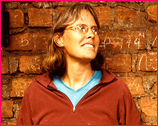 Amy Smith teaches mechanical engineering at the Massachusetts Institute of Technology and is the driving force behind the Development Design Summit, which in 2009 hosted hosted more than 70 innovators, from Zambian health care workers to Caltech engineering students, for five weeks in Ghana. Her work encompasses 100 scattered projects in the pursuit of a single goal: using simple technology to lessen the burden of the rural poor. “I believe that there is a need for us to focus on solving the world’s most difficult problems,” she argues – problems that affect “the billions of people who don’t have safe water, sanitation, and enough food to eat.”
Amy Smith teaches mechanical engineering at the Massachusetts Institute of Technology and is the driving force behind the Development Design Summit, which in 2009 hosted hosted more than 70 innovators, from Zambian health care workers to Caltech engineering students, for five weeks in Ghana. Her work encompasses 100 scattered projects in the pursuit of a single goal: using simple technology to lessen the burden of the rural poor. “I believe that there is a need for us to focus on solving the world’s most difficult problems,” she argues – problems that affect “the billions of people who don’t have safe water, sanitation, and enough food to eat.”
Read More
Filed under: Special Features | 3 Comments »
Tags: Humanitarian efforts
Posted on May 23rd, 2010 by ASEE
 UNICEF’s Voices of Youth Website provide a safe and supportive global cyberspace within which young people can explore, discuss and partner on issues related to human rights and social change, as well as develop their awareness, leadership, community building, and critical thinking skills through active and substantive participation with their peers and with decision makers globally.
UNICEF’s Voices of Youth Website provide a safe and supportive global cyberspace within which young people can explore, discuss and partner on issues related to human rights and social change, as well as develop their awareness, leadership, community building, and critical thinking skills through active and substantive participation with their peers and with decision makers globally.
Read More
Filed under: Web Resources | Comments Off on Website: UNICEF’s Voices of Youth
Tags: Humanitarian efforts, Web Resources
Posted on May 23rd, 2010 by ASEE
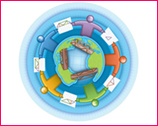 College student contestants in the UNESCO-Daimler Mondialogo competition strive to design functional, environmentally friendly solutions to pressing problems in some of the world’s poorest regions. The contest pairs teams of college students from prosperous nations, such as the United States, with students from the developing world. They work on projects — from better sewage disposal in an urban slum to bringing modern diagnostic techniques to rural clinics — keyed to the United Nations’ Millenium Development Goals. A story from Prism magazine, April 2009.
College student contestants in the UNESCO-Daimler Mondialogo competition strive to design functional, environmentally friendly solutions to pressing problems in some of the world’s poorest regions. The contest pairs teams of college students from prosperous nations, such as the United States, with students from the developing world. They work on projects — from better sewage disposal in an urban slum to bringing modern diagnostic techniques to rural clinics — keyed to the United Nations’ Millenium Development Goals. A story from Prism magazine, April 2009.
Read More
Filed under: Special Features | Comments Off on Feature: Teaming With Ideas
Posted on May 19th, 2010 by ASEE
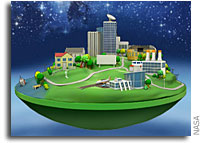 NASA@Home and City is a fun interactive program on the NASA Website that takes users on an illustrated tour of the commercial technologies and products in their homes and cities that trace their origins to NASA’s investment in space and aeronautics research and development. The agency has documented more than 1,500 examples of how these technologies have been used for bettering life on Earth.
NASA@Home and City is a fun interactive program on the NASA Website that takes users on an illustrated tour of the commercial technologies and products in their homes and cities that trace their origins to NASA’s investment in space and aeronautics research and development. The agency has documented more than 1,500 examples of how these technologies have been used for bettering life on Earth.
Read More
Filed under: Web Resources | 1 Comment »
Tags: NASA, Science and Technology, Website
Posted on May 19th, 2010 by ASEE
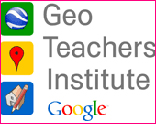 Google is hosting the first Google Geo Teachers Institute, July 21-22, 2010, at Mountain View, California. This free professional development experience is designed to help educators get the most from Google’s Geo products and technologies, including Google Earth, SketchUp, and Maps, including Mars, Moon, and Sky in Google Earth. Attendees will learn about innovative instructional strategies and receive resources to share with colleagues. No new information for 2011.
Google is hosting the first Google Geo Teachers Institute, July 21-22, 2010, at Mountain View, California. This free professional development experience is designed to help educators get the most from Google’s Geo products and technologies, including Google Earth, SketchUp, and Maps, including Mars, Moon, and Sky in Google Earth. Attendees will learn about innovative instructional strategies and receive resources to share with colleagues. No new information for 2011.
Read More
Filed under: For Teachers, K-12 Outreach Programs | Comments Off on Teachers’ Summer: Google Geo Institute. July 21-22, 2010
Tags: Programs for Teachers, Summer Programs (Teachers)
Posted on May 18th, 2010 by ASEE
 The Energy & Engineering Institute is a two-day hands-on workshop, August 9-10, 2010, for 20 middle school science and technology education teachers. The professional development will blend middle school science concepts for renewable energy with hands-on engineering design to raise awareness of the challenge to provide sustainable energy resources to meet growing world demand. Location: Stevens Institute of Technology, Hoboken. Application deadline: May 25, 2010. Stipend: $200; $110 classroom materials; professional development credit. No new information for 2011.
The Energy & Engineering Institute is a two-day hands-on workshop, August 9-10, 2010, for 20 middle school science and technology education teachers. The professional development will blend middle school science concepts for renewable energy with hands-on engineering design to raise awareness of the challenge to provide sustainable energy resources to meet growing world demand. Location: Stevens Institute of Technology, Hoboken. Application deadline: May 25, 2010. Stipend: $200; $110 classroom materials; professional development credit. No new information for 2011.
Read More
Filed under: For Teachers, K-12 Outreach Programs | Comments Off on Teachers’ Summer: Energy & Engineering. Hoboken, NY. Aug. 9-10, 2010
Tags: Energy and Environmental Technology, Professional Development, Programs for Teachers, Summer Programs (Teachers)
 Augmented reality (AR) technology is being hailed as the next big thing in the wireless world. Unlike virtual reality, which lets people seemingly enter artificial worlds, AR overlays digital information on real-world images viewed through the cameras of GPS-enabled handhelds, like smartphones. And already, one developer, Digital Tech Frontier, is marketing to schools its Augmented Reality Development Lab (ARDL) technology as a learning tool.
Augmented reality (AR) technology is being hailed as the next big thing in the wireless world. Unlike virtual reality, which lets people seemingly enter artificial worlds, AR overlays digital information on real-world images viewed through the cameras of GPS-enabled handhelds, like smartphones. And already, one developer, Digital Tech Frontier, is marketing to schools its Augmented Reality Development Lab (ARDL) technology as a learning tool.








 When it comes to helping kids learn science, parents and educators agree that Mom and Dad are falling down on the job, according to a new survey of 500 science teachers and 506 parents. A whopping 98 percent of the teachers surveyed said that parental involvement is important to keeping students interested in science. And, 94 percent said they wish their students’ parents had more chances to engage in science with their children. Seventy-seven percent suspected that too many parents just don’t feel comfortable with science topics to be of much assistance.
When it comes to helping kids learn science, parents and educators agree that Mom and Dad are falling down on the job, according to a new survey of 500 science teachers and 506 parents. A whopping 98 percent of the teachers surveyed said that parental involvement is important to keeping students interested in science. And, 94 percent said they wish their students’ parents had more chances to engage in science with their children. Seventy-seven percent suspected that too many parents just don’t feel comfortable with science topics to be of much assistance. Too many science teachers in the U.S. — especially at the elementary and middle school levels — aren’t fully qualified to teach the subject. For instance, more than 70 percent of middle school science teachers in Chicago schools do not have a degree or endorsement in science. To address that problem, Chicago’s Museum of Science and Industry and the Illinois Institute of Technology (IIT) have teamed up to offer what they say is a first of its kind program to bolster the skills of middle school science teachers.
Too many science teachers in the U.S. — especially at the elementary and middle school levels — aren’t fully qualified to teach the subject. For instance, more than 70 percent of middle school science teachers in Chicago schools do not have a degree or endorsement in science. To address that problem, Chicago’s Museum of Science and Industry and the Illinois Institute of Technology (IIT) have teamed up to offer what they say is a first of its kind program to bolster the skills of middle school science teachers. Amy Smith teaches mechanical engineering at the Massachusetts Institute of Technology and is the driving force behind the Development Design Summit, which in 2009 hosted hosted more than 70 innovators, from Zambian health care workers to Caltech engineering students, for five weeks in Ghana. Her work encompasses 100 scattered projects in the pursuit of a single goal: using simple technology to lessen the burden of the rural poor. “I believe that there is a need for us to focus on solving the world’s most difficult problems,” she argues – problems that affect “the billions of people who don’t have safe water, sanitation, and enough food to eat.”
Amy Smith teaches mechanical engineering at the Massachusetts Institute of Technology and is the driving force behind the Development Design Summit, which in 2009 hosted hosted more than 70 innovators, from Zambian health care workers to Caltech engineering students, for five weeks in Ghana. Her work encompasses 100 scattered projects in the pursuit of a single goal: using simple technology to lessen the burden of the rural poor. “I believe that there is a need for us to focus on solving the world’s most difficult problems,” she argues – problems that affect “the billions of people who don’t have safe water, sanitation, and enough food to eat.”
 College student contestants in the UNESCO-Daimler Mondialogo competition strive to design functional, environmentally friendly solutions to pressing problems in some of the world’s poorest regions. The contest pairs teams of college students from prosperous nations, such as the United States, with students from the developing world. They work on projects — from better sewage disposal in an urban slum to bringing modern diagnostic techniques to rural clinics — keyed to the United Nations’ Millenium Development Goals. A story from Prism magazine, April 2009.
College student contestants in the UNESCO-Daimler Mondialogo competition strive to design functional, environmentally friendly solutions to pressing problems in some of the world’s poorest regions. The contest pairs teams of college students from prosperous nations, such as the United States, with students from the developing world. They work on projects — from better sewage disposal in an urban slum to bringing modern diagnostic techniques to rural clinics — keyed to the United Nations’ Millenium Development Goals. A story from Prism magazine, April 2009.
 Google is hosting the first Google Geo Teachers Institute, July 21-22, 2010, at Mountain View, California. This free professional development experience is designed to help educators get the most from Google’s Geo products and technologies, including Google Earth, SketchUp, and Maps, including Mars, Moon, and Sky in Google Earth. Attendees will learn about innovative instructional strategies and receive resources to share with colleagues. No new information for 2011.
Google is hosting the first Google Geo Teachers Institute, July 21-22, 2010, at Mountain View, California. This free professional development experience is designed to help educators get the most from Google’s Geo products and technologies, including Google Earth, SketchUp, and Maps, including Mars, Moon, and Sky in Google Earth. Attendees will learn about innovative instructional strategies and receive resources to share with colleagues. No new information for 2011. The Energy & Engineering Institute is a two-day hands-on workshop, August 9-10, 2010, for 20 middle school science and technology education teachers. The professional development will blend middle school science concepts for renewable energy with hands-on engineering design to raise awareness of the challenge to provide sustainable energy resources to meet growing world demand. Location: Stevens Institute of Technology, Hoboken. Application deadline: May 25, 2010. Stipend: $200; $110 classroom materials; professional development credit. No new information for 2011.
The Energy & Engineering Institute is a two-day hands-on workshop, August 9-10, 2010, for 20 middle school science and technology education teachers. The professional development will blend middle school science concepts for renewable energy with hands-on engineering design to raise awareness of the challenge to provide sustainable energy resources to meet growing world demand. Location: Stevens Institute of Technology, Hoboken. Application deadline: May 25, 2010. Stipend: $200; $110 classroom materials; professional development credit. No new information for 2011.